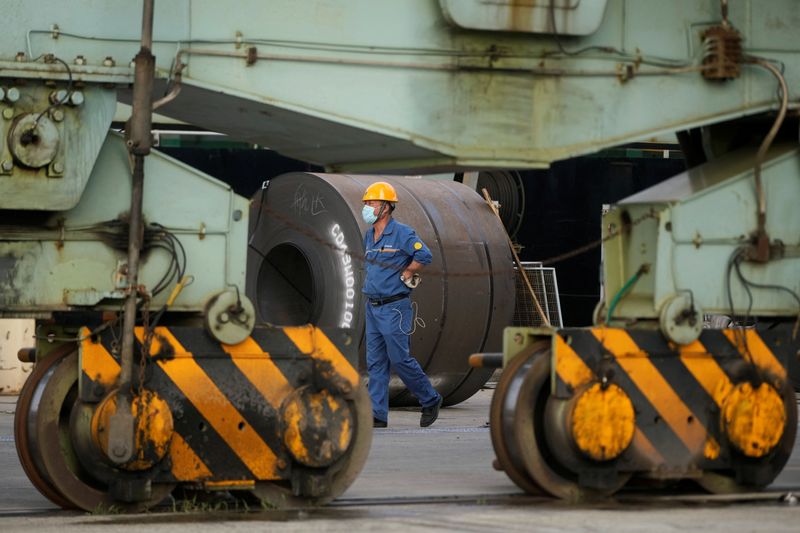By Kevin Yao, Joe Cash and Ellen Zhang
BEIJING (Reuters) - The last day of U.S. Secretary Janet Yellen's trip to China coincided with the strongest retort yet from Beijing officials over her claims that China is flooding global markets with cheap goods, particularly in the new green industries.
As Yellen laid out plans to formalise dialogue with China over excess industrial capacity in electric vehicles (EVs), solar panels and batteries, saying Washington would not accept U.S. industry being "decimated", the Chinese finance ministry issued a statement saying it had already "fully responded" to her concerns.
Commerce Minister Wang Wentao, at a roundtable meeting with Chinese EV makers in Paris on Monday, said U.S. and European assertions of excess capacity were groundless, adding China's rise in these industries was driven by innovation and complete supply chain systems, among other factors.
China's latest response, analysts say, centres on the idea that its production system is simply more competitive, a sharp change in tone from only a month ago when officials including Premier Li Qiang sounded their own warnings on overcapacity.
The strong pushback from Beijing contrasts with the generally warm interactions between Yellen and Chinese officials during her trip, leaving the two largest economies further apart on the hottest dispute in global trade, which could add to tensions.
"They cannot win the race, so they try to slow it down," said Li Yong, chief researcher at D&C Think, a Chinese think tank, referring to the West's rhetoric on overcapacity.
"We just do our things, they can do whatever they want -- the knife is in their hands."
Both sides believe they have solid, data-supported arguments not to back down.
The core criticism coming primarily from Washington and Brussels is that state-led support for manufacturers, coupled with depressed domestic demand, is pushing excessive Chinese supply onto global markets.
This drives down prices.
Consequently, it threatens U.S. and EU firms which survive on profits rather than what Western officials argue is a drip-feed of state resources in China. And, it can complicate longer-term investment decisions.
While China denies subsidies and points to U.S. and EU government programmes to support their own industries, its critics take a wider view of state support that incorporates cheap loans, land use, huge infrastructure investment and other benefits that span across a fully-integrated supply chain.
EU trade officials have singled out the huge resources redirected by China's state-dominated financial system from the ailing property sector to its sprawling manufacturing complex, as Beijing looks for other economic growth drivers.
For its part, China says industrial overcapacity is not unique to the world's second-largest economy.
"The so-called 'overcapacity' is a manifestation of the market mechanism at work, where supply-demand imbalance is often the norm," vice finance minister Liao Min told local media.
"This can occur in any market economy system, including in the United States and other Western countries, where it has happened multiple times in history”.
Industrial capacity utilisation in China is lower than in the United States or Europe, but not by much.
Also, China asserts supply and demand should be viewed from a global perspective, particularly given Western criticism focuses on industries key to climate goals for the entire planet.
That argument resonates.
"I'm very sceptical about this idea of overcapacity," Nicholas Lardy, senior fellow at Peterson Institute told a financial forum in Hong Kong.
"If you think about it, it means every country should only produce what it consumed itself. That means no trade. Where would we be if there was no trade?"
It's not a new debate. More than a decade ago, Washington complained that the U.S. rust belt was crippled by Chinese overproduction of steel, which had forced China to dump it at very low prices.
But China can argue its output is more in tune with global demand than it was back then. China's inventory levels have ticked up during the COVID-hit years, but remain well below levels seen in the 2010s.
China views the "new three" industries of electric vehicles, batteries and solar power as key for its development.
In 2023, exports of the "new three" totalled 1.06 trillion yuan ($146.6 billion), up 29.9% year-on-year, official data showed. But they accounted for only 4.5% of China's total yuan-denominated exports last year, so those on Beijing's side of the debate see the West's focus on them as hypocritical.
"U.S. and Europe have a bit of a gangster logic," said Wang Jun, chief economist at Huatai Asset Management.
In the automotive sector, China argues overcapacity is concentrated in combustion-engine cars rather than EVs and says market mechanisms will eventually weed out weak players.
Moreover, some models by Chinese EV maker BYD (SZ:002594) sell in Germany for more than double their price in China - an argument that critics use against Europe's concerns over unfair pricing.
China also says many of its firms are more innovative, hence more competitive. It can point to surpassing the United States as world leader in patent applications.
One industry where global demand does not keep up with Chinese production, though, is solar.
Xuyang Dong, China energy policy analyst at Climate Energy Finance in Sydney, estimates China's wafer, cell and module capacity coming online in 2024 is sufficient to meet annual global demand now through to 2032.
"If you think of it from this perspective, the Chinese government is subsidising the whole world's green transition," said Yue Su, principal China economist at the Economist Intelligence Unit.
"Whether this is fair to EU manufacturers or workers is a different question."

"Having said that, even if the West increases tariffs, I still foresee that China is going to dominate in many of these industries."
($1 = 7.2327 Chinese yuan renminbi)